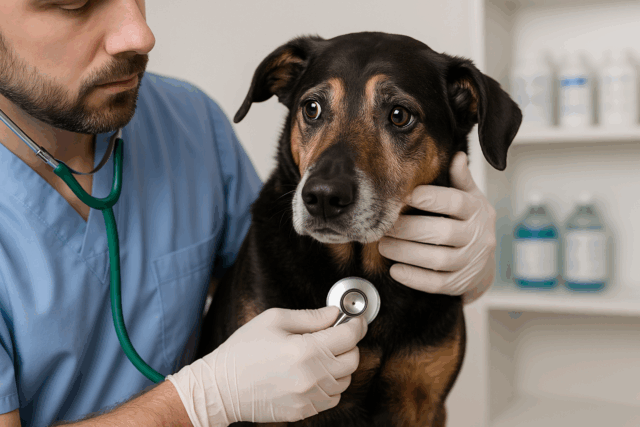
Dogs often hide their discomfort. Being alert to dog health signs helps you know when to visit the vet.
Why Recognizing Dog Health Signs Matters
Dogs cannot tell us they’re sick, but their behavior and body give clues. You just need to watch closely.
Recognizing dog illness early can lead to faster treatment and better outcomes. Timely dog checkups can save lives.
Loss of Appetite or Sudden Increase
If your dog stops eating or eats excessively, something may be wrong. Appetite changes often indicate internal issues.
Metabolic problems, infections, or stress can all cause appetite shifts. Always mention it during your dog’s veterinary care visit.
Increased Thirst and Urination
Drinking more water than usual may signal diabetes, kidney problems, or hormonal disorders. Frequent urination is another clue.
If your dog has accidents in the house, this is a common sign. It should never be ignored or delayed.
Vomiting or Diarrhea That Doesn’t Stop
One-time vomiting may just be a reaction to food. But repeated vomiting means something more serious could be happening.
Persistent diarrhea also deserves a vet visit. Dehydration and underlying illness are possible complications.
Unusual Lethargy or Low Energy
If your dog suddenly becomes inactive or withdrawn, it could be sick. Lethargy is one of the most common symptoms.
Even senior dogs should still respond to stimulation. If they don’t, it’s time for a thorough dog checkup.
Breathing Trouble or Persistent Coughing
Coughing, wheezing, or labored breathing are signs of lung or heart problems. Some conditions need urgent treatment.
This is when to visit the vet immediately. Respiratory issues can turn dangerous quickly.
Limping or Trouble Standing
A dog that limps or avoids putting weight on a leg may be in pain. Injury or joint problems are likely causes.
If limping lasts more than a day, schedule a dog checkup. Dogs often hide pain well.
Bad Breath or Dental Changes
Foul breath usually means dental disease. Swollen gums, drooling, or loose teeth are also red flags.
Dog veterinary care should always include regular dental checks. Oral infections can spread to other organs.
Skin Irritations or Hair Loss
Excessive scratching, bald spots, redness, or bumps are all reasons for concern. Skin reflects overall health in many dogs.
Parasites, allergies, and infections are common causes. Don’t wait to get your dog relief.
Itchy Ears, Head Shaking, or Odor
Frequent head shaking or ear scratching can mean ear mites, infection, or allergies. Odor is another warning sign.
Only a vet can confirm what’s causing the issue and prescribe appropriate treatment.
Eye or Nose Discharge
Discharge that is clear is less worrisome. But thick, colored, or bloody discharge needs a vet’s evaluation.
Don’t wait too long—eye infections or injuries can worsen fast and damage vision.
Sudden Behavioral Changes
If your dog suddenly becomes aggressive, fearful, or hides more often, this could mean they are in pain.
Changes in mood are sometimes the only sign of illness. Trust your instincts and seek help.
Swollen Belly or Painful Abdomen
A firm or bloated belly is a serious warning sign. It could mean internal bleeding, bloat, or infection.
Bloat is deadly without emergency surgery. This is definitely when to visit the vet without delay.
Seizures or Fainting Episodes
Even one seizure is a medical emergency. Your vet will test for toxins, epilepsy, or organ problems.
Loss of consciousness, confusion, or collapse should always trigger a veterinary visit immediately.
Unexplained Odors
New or bad smells from your dog’s body, mouth, or ears might signal infection or poor hygiene.
These smells often show up before visible symptoms. A quick check can lead to early treatment.
Ongoing Conditions Need Monitoring
Dogs with allergies, diabetes, or arthritis need regular checkups. These visits help adjust medication or dietary needs.
Veterinary care improves quality of life and prevents complications that might otherwise go unnoticed.
Senior Dogs Require Frequent Checkups
Aging dogs face more health risks, including heart disease, kidney failure, and cancer. Routine exams are critical.
Senior dogs should visit the vet at least twice a year. Don’t assume signs of aging are normal decline.
Puppies Need More Frequent Visits
Young dogs are vulnerable to infection and parasites. Early vet visits help build a healthy foundation.
Your puppy will also need vaccines, parasite screening, and growth tracking at these early checkups.
Preventive Veterinary Care is Key
Don’t wait until your dog shows symptoms. Annual exams, bloodwork, and vaccinations are part of good preventive care.
Ask your vet about tailored care based on age, size, breed, and lifestyle. Prevention is always easier than treatment.
Preparing for a Vet Visit
Keep a record of symptoms, photos, or videos. This helps your vet understand the timeline and severity of changes.
Don’t forget to ask questions and follow up as recommended. Active participation helps your dog get better faster.
Conclusion
Knowing when to visit the vet protects your dog from suffering. You are their best advocate for good health.
Watch for any change in behavior or appearance. Early action and dog checkups save lives and improve well-being.
Sources
- VCA Animal Hospitals – Your Dog’s Annual Visit
- ASPCA – General Dog Care
- AVMA – Dog Symptoms You Should Never Ignore
- PetMD – When to Go to the Vet
Image credit: Licensed stock image used with permission from depositphotos.com






